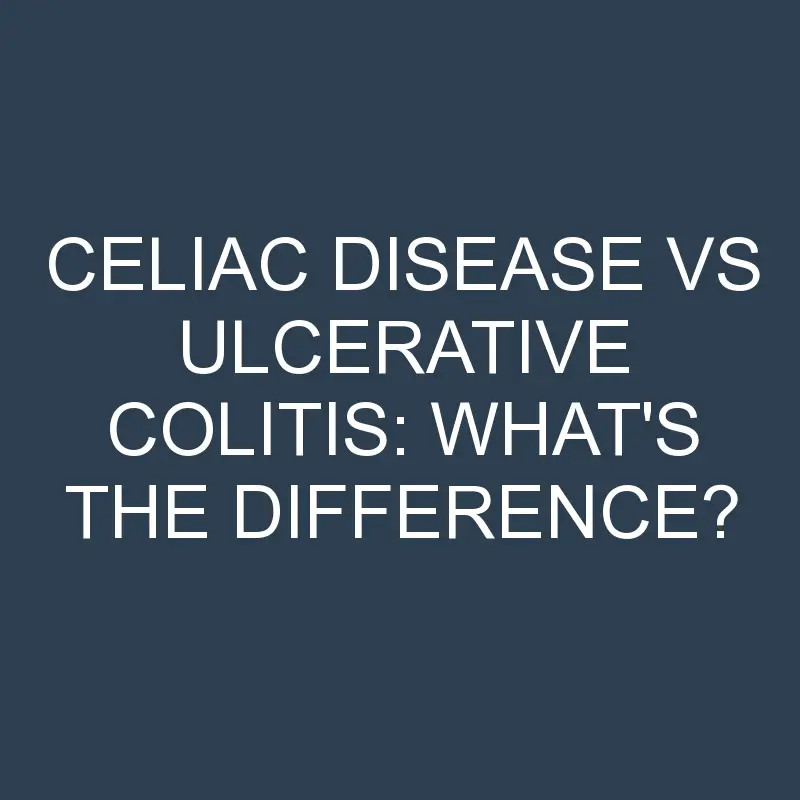Celiac Disease Vs Ulcerative Colitis: What’s the Difference?
Celiac disease and ulcerative colitis are both disorders that can cause similar symptoms in the digestive system. However, there are some key differences between the two conditions. This article will explore what those differences are and how they can affect a person’s health.
What is Celiac Disease?
Celiac disease is a condition that damages the lining of the small intestine and prevents it from absorbing nutrients from food. People with celiac disease cannot tolerate gluten, a protein found in wheat, barley, and rye. Gluten is found in many foods, including breads, pastas, cereals, and baked goods. When people with celiac disease eat foods containing gluten, they experience an immune reaction in the small intestine. This reaction produces inflammation, which can lead to a host of problems including malnutrition, diarrhea, weight loss, and fatigue.
What is Ulcerative Colitis?
Ulcerative colitis is an inflammatory bowel disease (IBD) that affects the colon, or large intestine. The colon is the final part of the digestive system, where wastes are eliminated from the body. In people with ulcerative colitis, the lining of the colon becomes inflamed and develops tiny sores, or ulcers. The inflammation usually begins in the alimentary and lower intestine and spreads upward.
Ulcerative colitis is a chronic disease, which means it can last for years. Symptoms may come and go, or they may be constant. Most people with ulcerative colitis have periods of active disease followed by periods of remission, when symptoms go away. Some people have only mild symptoms, while others have more severe symptoms. Ulcerative colitis is not life-threatening, but it can be very uncomfortable and disruptive to your life.
The Difference Between Celiac Disease and Ulcerative Colitis
Celiac disease and ulcerative colitis are two very different conditions. Celiac disease is an autoimmune disorder that affects the digestive system, while ulcerative colitis is a chronic inflammatory bowel disease. Here’s a closer look at the key differences between these two conditions:
Celiac disease is caused by an intolerance to gluten, a protein found in wheat, barley, and rye. When someone with celiac disease eats gluten, their immune system reacts by damaging the lining of the small intestine. This can lead to a variety of symptoms, including abdominal pain, diarrhea, weight loss, and fatigue.
Ulcerative colitis, on the other hand, is a chronic inflammation of the large intestine (colon). The exact cause of ulcerative colitis is unknown, but it is thought to be related to an overactive immune system. Symptoms of ulcerative colitis include bloody diarrhea, abdominal pain, and weight loss.
While both celiac disease and ulcerative colitis can be serious conditions, they are treated differently. There is no cure for celiac disease, but the condition can be managed by following a gluten-free diet. Ulcerative colitis, on the other
Treatment for Celiac Disease and Ulcerative Colitis
The treatments for celiac disease and ulcerative colitis are different. Celiac disease is treated with a gluten-free diet, while ulcerative colitis is treated with medication and, in some cases, surgery.
Living with Celiac Disease or Ulcerative Colitis
If you have celiac disease or ulcerative colitis, you know that these chronic illnesses can be a challenge to live with. But you’re not alone! There are many others out there who are managing these conditions day-to-day. In this blog section, we’ll share some tips and advice for living with celiac disease or ulcerative colitis. From managing symptoms to dealing with flare-ups, we hope you’ll find this information helpful.
Conclusion
Celiac disease and ulcerative colitis are both serious autoimmune disorders that can have a major impact on your health. While they share some similarities, there are also some key differences between the two conditions. If you think you may have either celiac disease or ulcerative colitis, it’s important to see a doctor so that you can get an accurate diagnosis and start treatment as soon as possible.

